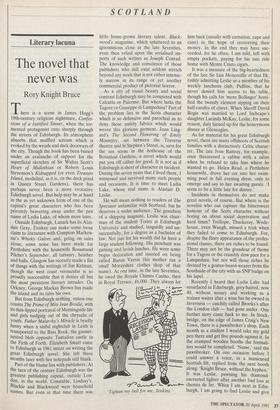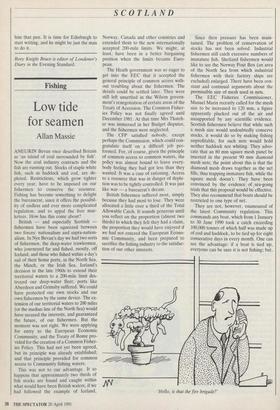SCOTLAND
Literary lacuna
The novel that never was
Rory Knight Bruce
There is a scene in James Hogg's 19th-century religious nightmare, Confes- sions of a Justified Sinner, when the tor- mented protagonist runs sharply through the streets of Edinburgh. Its atmosphere absorbs that muffled scream which is evoked by the wynds and dark doorways of the city. Though the book has been buried under an avalanche of support for the superficial sketches of Sir Walter Scott's Heart of Midlothian or Robert Louis Stevenson's Kidnapped (or even Treasure Island, modelled, as it is, on the duck pond in Queen Street Gardens), there has perhaps never been a more evocative Edinburgh novel. But help may be at hand in the as yet unknown form of one of the capital's great characters who has been privately beavering away under the pen name of Lydia Lake, of whom more later.
Outside Edinburgh, Lanark has its Alas- dair Gray, Eriskay can make some loose claim to literature with Compton Macken- zie's Whisky Galore and, going on sales alone, some noise has been made for Perthshire with the housewife Rosamund Pilcher's September, all tartanry, heather and balls. Glasgow has recently made a fist of things with the writings of Jim Kelman, though the west coast vernacular is so proudly inaccessible that it denies all but the most persistent literary intruder. On Orkney, George Mackay Brown has made the island and its tales his own.
But from Edinburgh nothing, unless one counts The Prime of Miss Jean Brodie, with its thin-lipped portrayal of Morningside life and girls nudging out of the chrysalis of youth. Father Malarchy's Miracle is briefly funny when a sinful nightclub in Leith is transported to the Bass Rock, the gannet- nested blob opposite Tantallon castle in the Firth of Forth. Elizabeth Smart came to Edinburgh in 1981 intent on writing the great Edinburgh novel. She left three months later with her notepads still blank.
Part of the blame lies with publishers. At the turn of the century Edinburgh was the greatest publishing capital, outside Lon- don, in the world. Constable, Lindsay's, Blackie and Blackwood were household names. But even at that time there was little home-grown literary talent. Black- wood's magazine, which spluttered to an ignominious close in the late Seventies, even then relied upon the serialised im- ports of such writers as Joseph Conrad. The knowledge and conscience of those publishers who still exist seldom stretch beyond any work that is not either intense- ly narrow in its range or yet another commercial product of pictorial horror.
As a city of visual beauty and social contrast Edinburgh may be compared with Calcutta or Palermo. But where lurks the Tagore or Giuseppe di Lampedusa? Part of the problem lies in the Scots character which is so defensive and parochial as to deny those untidy fabrics which would weave this glorious garment. Joan Ling- ard's The Second Flowering of Emily Mountjoy, set between the Traverse theatre and St Stephen's Street, is, save for the sex scene in the hothouse of the Botanical Gardens, a novel which would put you off either for good. It is not as if Edinburgh is short of character or incident. During the seven years that I lived there, I witnessed and survived many such people and occasions. It is time to meet Lydia Lake, whose real name is Alastair D. Leslie.
He will mean nothing to readers of The Spectator unfamiliar with Scotland, but he deserves a wider audience. The grandson of a shipping magnate, Leslie was chair- man of the student Tories at Edinburgh University and studied, languidly and un- successfully, for a degree as a bachelor of law. Not just for his wealth did he have a large student following. His penchant was gaming and lavish lunches. He wore some bogus decoration and insisted on being called Baron Varres (his mother ran a small Morayshire clothes shop of that name). At one time, in the late Seventies, he owed the Royale Chimes Casino, then in Royal Terrace, £6,00. They always let 'Tighten my belt for me, Jenkins.' him back (usually with carnation, cape and cane) in the hope of recovering their money. In the end they may have suc- ceeded, for he often, I am told, left with empty pockets, paying for his taxi ride home with Monte Cristo cigars.
It was a measure of the big-heartedness of the late Sir lain Moncreiffe of that Ilk, rashly admitting Leslie as a member of his weekly luncheon club, Puffins, that he never denied him access to his table, though his calls for 'more Bollinger' horri- fied the tweedy element sipping on their half-carafes of claret. When Sheriff David Bogie was married to Lord Inchcape's daughter Lucinda McKay, Leslie, for some reason, duly turned up for the honeymoon dinner at Gleneagles.
As for material for his great Edinburgh novel, there are many offshoots of Scottish families with a distinctively Celtic charac- ter. The late Ivan Rattray, for example, once threatened a cabbie with a sabre when he refused to take him where he wanted to go. Helen Read, a Perthshire housewife, drove her car into her swim- ming pool in full evening dress, only to emerge and say to her awaiting guests: 'I seem to be a little late for dinner.'
Incidents in themselves do not make great novels, of course. But where is the novelist who can capture the bittersweet humour of the Scots character without boring on about social deprivation and hard times? Trollope, Thackeray, Wode- house , even Waugh, missed a trick when they failed to come to Edinburgh. For, despite the flinty appearance of the profes- sional classes, there are riches to be found. There may not be the grandeur of theme for a Tagore or the crumbly slow pace for a Lampedusa, but nor will those riches be divined by a goatee-beard-wearer from the Southside of the city with an SNP badge on his lapel.
Recently I heard that Lydia Lake had resurfaced in Edinburgh, grey-haired, now 40, without money and working as a trainee waiter after a wine bar he owned in Inverness — catchily called Brooks's after the London club — had gone under. One further story came back to me. In Stock- bridge, on the edge of James Craig's New Town, there is a pawnbroker's shop. Each month as a student I would take my gold pen there and get five pounds against it. In the cramped wooden booths the formali- ties would be completed. 'Name,' said the pawnbroker. On one occasion before I could answer a voice, in a manicured Scottish lilt, replied from the next booth along: 'Knight Bruce, without the hyphen.' It was Leslie, pawning his diamond- encrusted lighter after another bad loss at chemin de fer. When I am next in Edin- burgh, I am going to find Leslie and give
SCOTLAND
him that pen. It is time for Edinburgh to start writing, and he might be just the man to do it.
Rory Knight Bruce is editor of Londoner's Diary in the Evening Standard.



























































 Previous page
Previous page